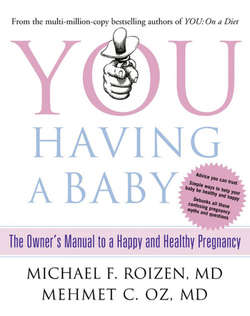Читать книгу You: Having a Baby: The Owner’s Manual to a Happy and Healthy Pregnancy - Michael Roizen F. - Страница 38
The Truth About Miscarriages
ОглавлениеThere are typically four broad categories of reasons why women miscarry: One, the fetus has some kind of developmental defect or genetic abnormality that is incompatible with survival. Two, the woman has some kind of medical issue that diminishes the ability of the placenta to get nutrients to the baby; for instance, conditions like the immune disease lupus and connective tissue disorders tend to destroy the placenta. Three, the woman has a hormonal imbalance that prevents the corpus luteum from successfully supporting the fetus during the first trimester. And four, the maternal immune system can overreact and reject the fetus.
One miscarriage isn’t usually enough to concern docs about your future ability to carry babies. But after three miscarriages, docs will perform a full medical workup to try to get a sense of what might be causing your body to reject the fetus. They’re typically on the look-out for such things as chromosomal abnormalities, diabetes, autoimmune disorders, thyroid issues, and hypertension. Infections acquired during pregnancy can also cause a bit of a resource tug-of-war in the womb, as your body tries to both fight the infection and protect the fetus.
Any loss is difficult and emotional, but we also don’t believe that miscarriage means you have to panic about your possibilities of motherhood. About 20 percent of known pregnancies end in miscarriage, and it’s likely that half of all fertilized eggs have chromosomal abnormalities and are flushed out before you even know you’ve conceived—underscoring what a truly delicate process pregnancy is.
Since many women begin to bond with their babies the moment they miss a period or find out they are pregnant, the loss of a little one, no matter in what trimester of pregnancy, can lead to feelings of sorrow, guilt, anger, and even fear that they may never be able to have a baby again. Just as we work through the stages of grief with any other loss in our lives, it’s especially important to go through the grieving process to help with healing after a miscarriage. It helps many folks to seek professional help; all delivery units have resources to help you both move on and honor the memory of your little one.
Factoid: A substance called corin is produced in the uterus during pregnancy to help keep blood pressure low (at least in animal uteri and postulated in humans). When you don’t produce it, you can develop high blood pressure and protein in your urine, both signs of preeclampsia. You need both calcium and vitamin D to activate the gene that produces corin. See page 81 for recommended amounts.
Progesterone: This hormone helps maintain the inner layer of the uterus to provide support for the developing embryo. It also serves the very important role of quieting the uterine muscle, so the blastocyst can have a safe landing while implanting.
Human Placental Lactogen: Besides helping with milk preparation, this hormone also increases a mom’s metabolism during pregnancy (she needs more energy caring for another human, after all), which we’ll discuss in detail in chapter 4.
Human Chorionic Gonadotropin: This hormone stimulates the corpus luteum (the part of the follicle left behind in the ovary) to produce estrogen and progesterone in the first ten weeks after conception, until the placental cells can do so by themselves. For this reason, it is also the hormone we check in your urine or blood to determine whether you’re pregnant. Levels of hCG, which have been associated with morning sickness (more on that in the next chapter), typically peak toward the end of the first trimester, then decline and level off for the rest of the pregnancy.
